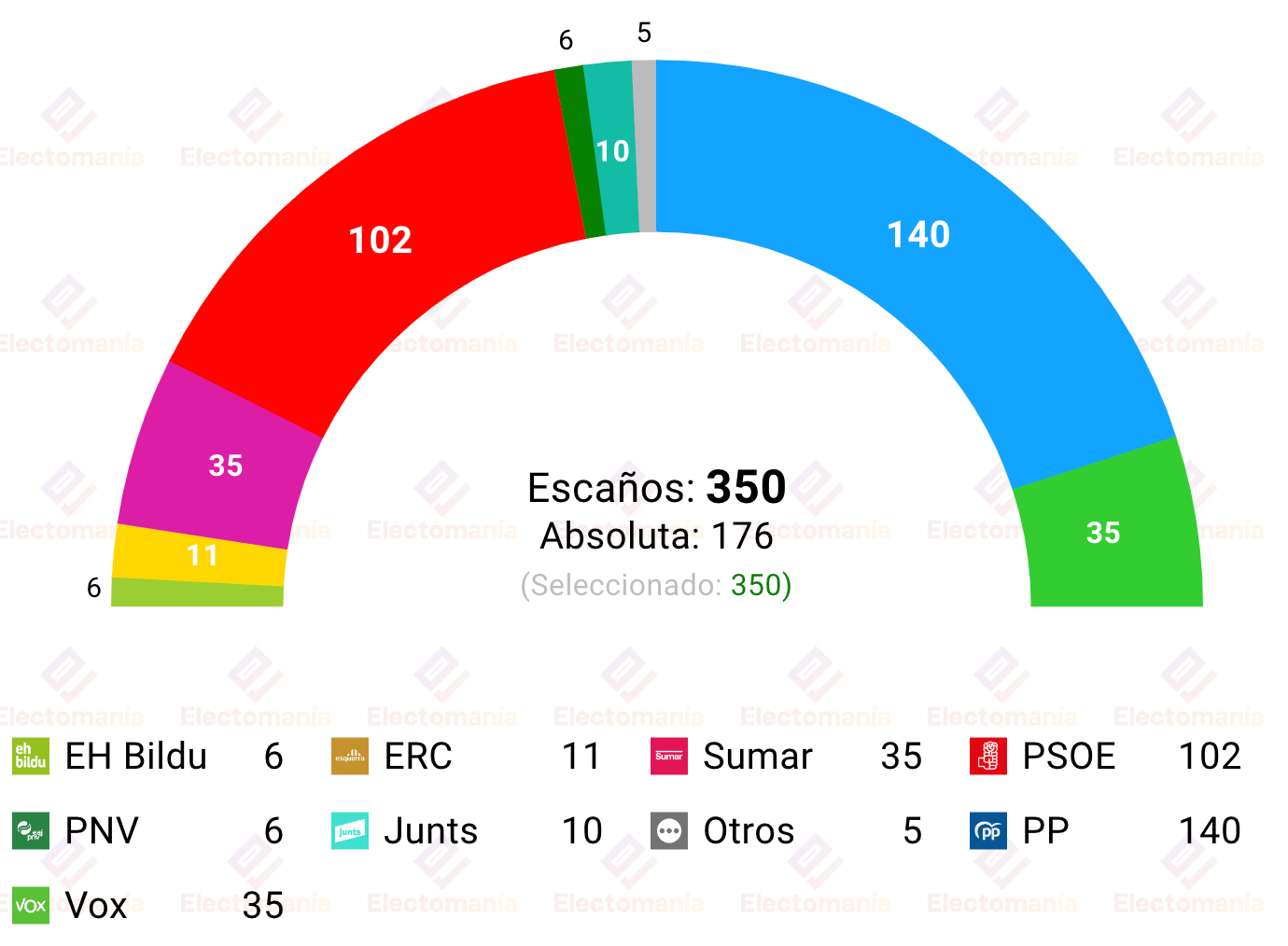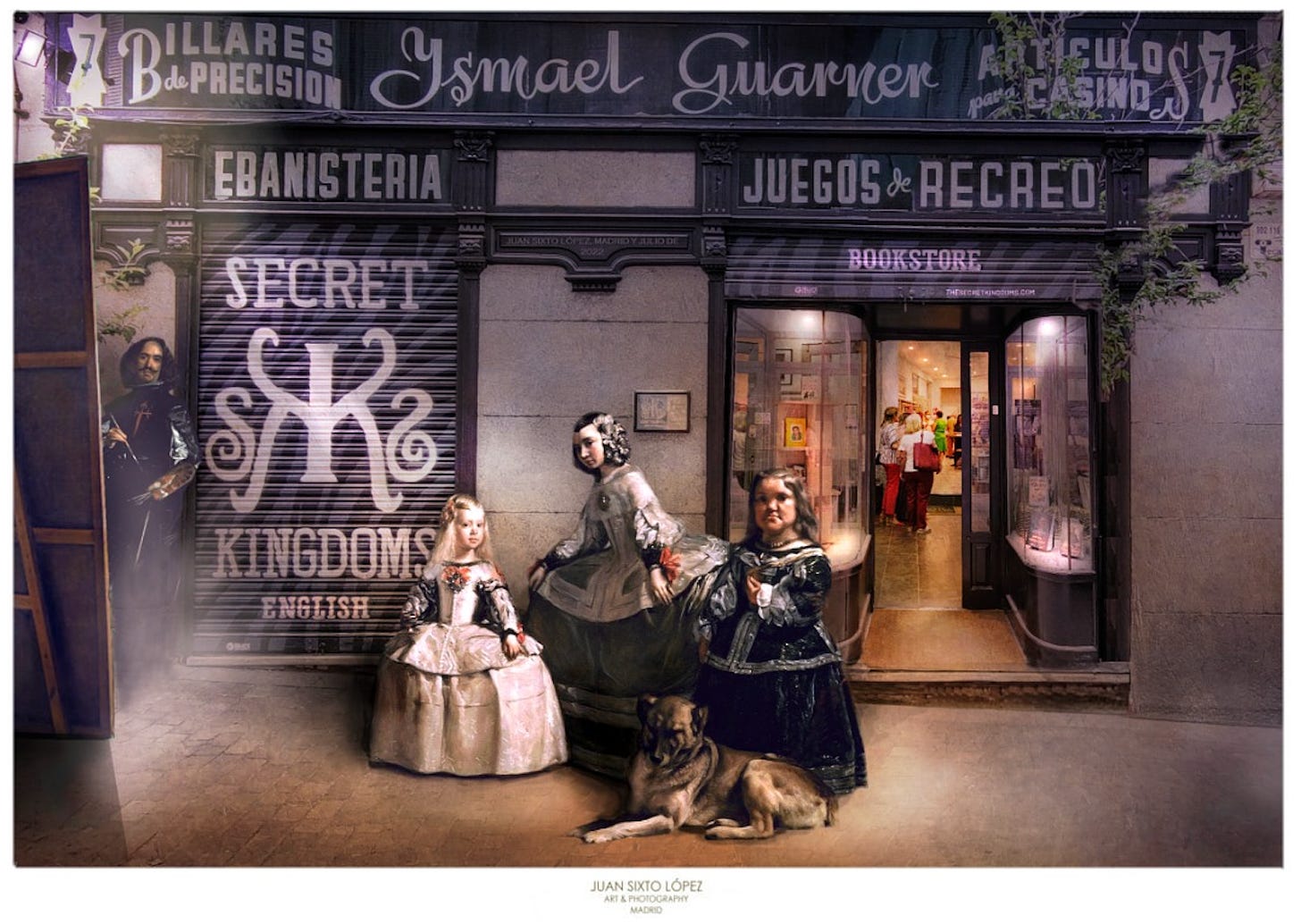🗳️ This Week in Spain: Blue Summer, Maybe
Also: A downed banner, found antiquities and freed nipples.
By @IanMount and @AdrianBono | June 29, 2023 | Madrid | Issue #20
🎉 Welcome to The Tapa, an English-language, weekly newsletter about all things Spain!
🥜 This Week in a Nutshell: Attention has moved over to PP’s Núñez Feijóo, who is doing his best to battle Prime Minister Sánchez and get the attention of the Spanish electorate. Will he succeed? We’ll have to wait until the debates.
🙏 Remember that if this email gets truncated at the bottom because it’s too long, just click here to read the rest on Substack.
🕺If you haven’t subscribed yet, please do so by clicking on the button below.
🫶 And if you already have, please send this newsletter around to your friends and family and help us keep growing.
Don’t worry, we don’t bite
🔵 PP Boss Alberto Nuñez Feijóo Would Like Your Attention (Please Don’t Pay Any Mind to Vox)
The poll-leading center-right Partido Popular (PP) and its leader Alberto Núñez Feijóo tried to take back the 23J campaign spotlight after the media (and population) spent a week focused on the unpleasant outbursts of the PP’s likely government coalition partner, the hard-right Vox.
Look at us, we’re moderate! The PP rolled out Feijóo’s economic plan, his debate plans—and even a rainbow PP logo to celebrate Pride. All super-normal!
But I’m only one who can save you! Acting Prime Minister Pedro Sánchez refused to cede the stage, however, granting interviews to Jordi Évole, El Hormiguero—even to the Gen Z podcasters La Pija y la Quinqui—to explain why the right winning meant the end of Spain (hey Pedro, where’s our interview?).
And, no, we won’t shut up! Nor did Vox sit quietly on the sidelines. The hard rightees made noise about their presence in the Extremadura government, their big anti-LGBTQ banner in Madrid, and standing up against the fearsome danger that is…Virginia Woolf?
So Feijóo didn’t exactly get the week he wanted. But he tried and he got something, and that’s what matters. Let’s get into it.
Alberto Núñez Feijóo is a congenitally cautious, middle-of-the-road, and awkward politician (fine: you can call him dull), the kind of guy for whom defending deals with Vox and debating Sánchez on TV would rank only slightly above a root canal.
He’s also been relentlessly pounded by the PSOE for not having yet released an economic plan or said who his economy minister will be (Sánchez, referring to his widely respected economy minister Nadia Calviño: “We have Nadia and they have Nadie.” — oh, political jokes 😆!)
So on Monday, Feijóo released a 20-point economic plan at a speech in Barcelona. It was, like the man himself, pretty calm in a center-right sorta way. We won’t go over each point, because this newsletter is not meant to be a sleep aid, but some basic guidelines:
Make the labor market great again: The PP set a goal of 22m workers registered with social security (there are 20.7m now, so this is not a massive jump). It also said it wanted a version of the “Austrian backpack”, in which workers take accrued unemployment benefits from job to job—and can spend them in retirement—to encourage them to follow opportunities and create a more dynamic job market.
Whack taxes: Drop the IRPF income tax for those making under €40,000. As inflation has boosted salaries, people have been pushed into higher tax brackets, so this is meant for the middle class that has experienced this.
Free tourism: Basically, form a national plan to invest in tourism and to remove some limitations like the ones former mayor Ada Colau put on hotel construction in Barcelona (the PP likes its occasional Colau diss).
Free the housing market: Remove price caps for rent increases—which the PP blames in part for the housing shortage—and create a system to remove okupas (squatters) within 24 hours (a populist nod to the slightly overblown fears about this).
‘Rebuild’ Catalonia: This is perhaps the most interesting one. Unlike Rajoy, who largely avoided Catalonia like“There be dragons there!”, Feijóo gave his speech in Barcelona and said, “I am going to focus on the Catalans living better with me, on having more work and better companies and on recovering unity.” This is at least a big tonal shift in PP orthodoxy toward Catalonia.
The economic proposal signaled the PP’s desire to shift toward normalcy after getting pounded for weeks over its deal with Vox in Valencia and the far right group’s constant anti-LGBTQ rhetoric (see the big anti-LGBTQ banner in Madrid, below).
Feijóo also agreed to a July 10 one-on-one debate with Sánchez—and did we mention his party rolled out a Pride PP logo because nothing says “We are so not Vox” than a rainbow logo!
The Balearic Islands even offered Feijóo some good news in his push to be the Dull Center-Right Party, when Vox agreed to abstain so the islands’ PP leader could be elected regional president (never mind the 110-point policy list they agreed to. Shhhhhh…).
Things are tightening, though. As we enter the final 3+ weeks of the campaign, the constant pounding on the PP’s need to ink deals with Vox—its leader in Extremadura, María Guardiola, who ruled out a coalition with Vox, is backtracking as we speak—is taking its toll. One recent poll by Sigma Dos found that the PP-Vox coalition had lost the overall majority and would only get 175 of the parliament’s 350 seats.
Now, the fight goes personal—and onto the TV show El Hormiguero. Sánchez gave his one-on-one Tuesday night, and Feijóo followed a day later (check out our take on the back-to-back in 5 Things below). And there’s plenty of drama to come: The first, and probably only, debate is in 10 days.
🔔 A Message From Our Sponsor
Secret Kingdoms is your English bookstore in Madrid. It specializes in Spanish history and literature, contemporary and classic novels, books for children and young adults of all ages, history and historical fiction, thrillers, science fiction, fantasy, poetry, biographies and much more.
Located on Calle de Moratín 7 — a few blocks away from the Prado Museum — and with over 20,000 new and used books, Secret Kingdoms has something for everyone.
Find out more at www.thesecretkingdoms.com
💬 Five things to discuss at dinner parties this week
1. 🐜 The political interviews at El Hormiguero
This week we saw the first (indirect) debate between Pedro Sánchez and Alberto Núñez Feijóo, as both candidates sat down for one-hour interviews with Pablo Motos, host of Antena 3’s El Hormiguero, one of the most popular TV shows in Spain. First it was PM Sánchez on Tuesday night, then Feijóo followed on Wednesday. In fact, the Feijóo interview broke audience records, with a staggering 3 million people tuning in (2.9 million tuned in to watch Sánchez).
The duel between Motos and Sánchez was worth watching, mostly because once again it was obvious that the Prime Minister is an articulate political animal who will always control the interview. Despite Motos’ attempt to play hardball and ask Sánchez uncomfortable questions about the “Only yes means yes” law, his relationship with the media, far-left Podemos, Catalonian separatism and his “unfulfilled promises”, Sánchez parried and redirected Motos with aggressive or distracting answers that left Motos nodding his head and often unable to articulate follow up questions.
El Confidencial’s aptly titled op-ed “Pablo Motos tries to ask Pedro Sánchez some stuff” summed it all up pretty well: “The host was nothing but an obstacle that Sánchez moved around with his unstoppable verbiage.” This was disappointing to some leaders on the right, who criticized Motos for letting Sánchez go mostly unscathed.
One day later it was Núñez Feijóo’s turn, and the PP candidate didn’t pull any punches.
Motos explained that his interview with the PP candidate was going to be different because Sánchez is already Prime Minister while Núñez Feijóo is not—so the point would be “to get to know him better”. But the tone was also significantly changed because Núñez Feijóo is a more careful—almost languorous—speaker. Motos asked pointed questions and Núñez Feijóo faced them, but without the slashing duel-like style of Sánchez.
Núñez Feijóo stressed that, if elected, he would draw from his experience in Galicia—where he was won broad majorities in his 13 years as regional president—to try to unite all of Spain. On a personal level, he also said he hoped he could be the first Prime Minister born in rural Spain.
When asked about the meaning of “Sanchismo”—the thing the PP says it wants to “repeal”—Núñez Feijóo humorously agreed with Sánchez's own description of it as "malice, lies, and manipulation" (though of course, Sánchez was referring to those who used the term, not to his politics).
The PP leader expressed concern over the chosen date for the elections, as it may lower voter turnout, and questioned the need for interrupting people's vacations to vote.
Surprise announcement! (Sort of.) Núñez Feijóo said he had already decided who would be his Deputy Prime Minister if he was elected—and she will be a women. He wouldn’t name who she was, though. (Booo.) He also said he had chosen, but would not name, his Economy Minister. (Boo. Pt. 2.)
As it’s Pride week… Motos also asked about Núñez Feijóo’s views on LGBT rights (especially since their far-right potential partner Vox has been causing, um, controversy with their own not-so-positive views on the matter). Feijóo said that LGBTQ+ rights are “sacred” but also said he intended to amend the Trans Law to include medical examinations, monitoring, a reflection period, and parental consent for minors. (Right now, one can officially change one’s gender with little effort.)
Now all we need to see is for Sánchez and Feijóo to debate each other in a few days. Patience. Just make sure you have the popcorn ready.
2. 👺 Most people just keep bicycles and paint in the trastero
Spain’s Guardia Civil discovered 119 ancient archeological works of an “incalculable economic value” in a storage locker in the town of Baena, in Córdoba.
In the operation, known as Operación Plotina, the police arrested a couple from Baena for crimes against cultural heritage.
Why it matters: The illicit trade in cultural artifacts is big business in Europe, and the world, and Operación Plotina was part of a Europe-wide operation called Pandora VII that involved Spain’s Guardia Civil, Europol and Interpol and led to 60 detentions and the recovery of 11,049 cultural goods.
The previous six annual Pandora operations (I-VI), which were first launched in 2016, netted 407 arrests and recovered 147,050 cultural goods.
How it worked: The Guardia Civil spent months working its way into the art world, interviewing collectors and visiting art fairs and galleries, and during this time heard of a couple that could be involved in illicit antiquities trading.
Guardia Civil: “Within the hermetic and complex world of the art market, it was possible to verify that the couple led a normal life, without great luxuries, acting at different times of the day in order to go completely unnoticed and to be able to bring the historical goods into the illicit market, thereby obtaining great economic benefits”.
But didn’t expect to find that: The Guardia Civil officers who tracked the couple to Baena came in for quite a shock when they opened the trastero and discovered Roman sculptures, seventh-century architectural works, exceptional antique ceramics, and “exotically rare” ancient Greek, Iberian and Roman coins.
The most shocking find was an almost perfectly preserved marble woman’s bust “of a similar quality to those shown in the Louvre”: “It is a private portrait from the first third of the 2nd century,” the Guardia Civil said. “following portrait models of imperial princesses who, due to the type of hairstyle, are similar to those of Salonina Matidia.”
Córdoba Museum director Lola Baena (no relation to the town, we hope): “The exceptionality of the piece is unquestionable and it is on a par with the best Roman sculpture of the second century made in Spanish workshops—also close in quality to those of Rome itself."
3. 💊 Griñán to avoid prison time after all
José Antonio Griñán, will not be going to prison after all. The 77-year-old former PSOE socialist president of the Junta de Andalucía (the regional government) had been sentenced to six years in jail and a 15-year ban on public office after being convicted in the “ERE” corruption case.
Why no prison? A Sevilla court determined that Griñan’s cancer was “severe” and “incurable” and incompatible with prison life.
Why such a big deal: Spain achieved peak political corruption during the years leading up to the 2007/8 economic crisis, and Griñan, along with his predecessor as president of the Junta, Manuel Chaves, were the highest ranking pols to be busted. But only the underlings appear likely to spend time in jail.
How we got here: The “Caso ERE” was an aid scheme whereby the Andaluz government gave money to businesses and workers suffering layoffs and early retirement. Fair enough. But how the money was handed out was totally uncontrolled and—surprise!—super-fraudulent. Time for a timeline.
The Junta de Andalucia set up a €680m, 10-year aid fund in 2000 to help businesses deal with the massive industrial collapse and ensuing layoffs the region was going through. The money was meant to pay for early retirement for some 6,300 laid off workers, as well as direct aid to businesses in trouble. To get the aid out in an agile way while faced with massive layoffs, the Junta eliminated a lot of the usual oversight. What could go wrong?
Well, lots could go wrong: The agency that oversaw the disbursements took to paying consultants up to 25% commissions for setting up the payments. They also granted early retirement to over 100 people for jobs they never had. And about 15% of the aid fund was given to businesses who were friendly to the PSOE government.
Oh, and there were drugs! An ex-chofer for the Junta’s director general of Work and Social Security testified that some of the money was used for “cocaine, parties, and drinks.” So at least they had fun!
Junta politicians began to see they were in heap big trouble. They said there was no fraud. Or maybe there was some fraud but they didn’t know about it. Or, okay, fine, perhaps they could have set up the oversight process a little better. But not their fault. Right?
Wrong. In one of the many trials (remember that), a Sevilla court wrote, “The political need to provide a rapid response to major socio-labor conflicts led those responsible for the Junta de Andalucía to establish an agile system, although such agility was achieved by eliminating the legally established control mechanisms.” It went on: "The result was an absolute lack of control.”
In the end, 22 high ranking Junta officials went on trial for embezzlement and fraud, and 19 were convicted.
Griñan, along with Chaves, were the stars of the trial. The supreme court ruled in September 2022 that Griñan could have stopped the embezzlement (he headed the economy and finance department before he was president) and that both ex-presidents set up the system in order to avoid oversight.
And the moral of the story is… Griñan’s (probably justifiable) escape from prison time is a paean to the glacial lethargy of the Spanish legal system. The investigation into the ERE system began in 2011 and the final definitive ruling didn’t come down until September 2022. In a system that worked at faster-than-a-dead-snail speed, he might be finishing—not starting—his sentence today.
Bonus! Andalucia will continue paying the early retirements until 2025.
4. 👀 Free the nipple!
Pride Month wraps up this weekend and Spain celebrations are in full swing. (No surprise there considering that, after Brazil, this country has the highest percentage of self-identified LGBTQ people in the world).
Yes, this is a proud, progressive nation. And then, sometimes, not really.
Singer Rocío Saiz was performing live last Saturday evening in Cardenal Beluga square, in Murcia, during the city’s Pride celebrations, when she took her shirt off and exposed her breasts. This wasn’t the first time she did it. In fact, she has done it lots of times recently. It’s sort of her thing. This time, however, it didn’t go as planned.
The music stopped and one of the organizers rushed on stage to cover her chest with a rainbow flag. The police had arrived, Saiz later explained, and they were threatening arrest. People in the audience started chanting “freedom” to express their support. After two songs, Saiz decided to end the concert, not without taking her shirt off again.
Saiz took to Twitter to tell her experience, explaining that officers threatened her with “handcuffing…for encouraging disorder, exhibitionism and contempt for authority”. The singer added “I CAN'T TAKE IT ANYMORE, I DON'T WANT TO DO IT ANYMORE. I'm not having fun anymore. I don't want to expose my body anymore. Let others do it. Let others fight.”
Plot twist! However, on Tuesday morning the Murcia Police Department issued a surprising statement distancing itself from the situation and apologizing to Saiz for the inconveniences caused.
The department said that the officer who warned her she’d be arrested “acted on his own accord, with his actions being incorrect and not informing the chain of command at any time.”
Disciplinary proceedings have been initiated against the inspector in question. 🫢
“Coherence has prevailed”, Saiz tweeted while sharing the police statement. “I want to make it clear that there are also wonderful police officers who are tarnished by such actions. We need safe spaces and we are tired of sexism and abuse of power.”
More pro-nipple news: Catalonia’s regional government, the Generalitat, warned local town governments this week that women had every right to sunbathe topless at municipal pools (some were apparently discouraging this). The complaint was made by a group called Mugrons lliures—Catalan for “Free Nipples.”
5. 🗑️ What goes up must come down
Vox hung a giant, controversial banner in Madrid about 10 days ago showing a hand with a Spanish flag bracelet throwing everything from the LGBT and feminist flags to the Sustainable Development Goals logo into a trash can (and urging voters to do the same). Remember that moment of high political marketing? Well, it's now gone.
Why? Turns out that the Madrid Electoral Board was not happy with it. But not because its aggressive message (that some considered hate speech), but because it considered it to be election propaganda, something that political parties can’t put up until the 23J campaign officially begins.
The Board warned Vox that it had until midnight on Tuesday to remove it as it was in clear violation of Article 53 of the electoral law (Loreg), which prohibits electoral propaganda between the moment an election is announced and the legal start of the campaign. The banner was removed and folded a few hours after noon on that same day.
So when does the campaign actually begin? According to the law, the electoral campaign officially begins sixteen days before election day, so before the 23J elections, political propaganda is banned until midnight of July 7.
The Electoral Board said it had decided not to begin a disciplinary procedure, but warned that it could be considered “in the case of repeated behavior”. What does that mean? Well, basically that they’re trying to avoid more controversy. But they may not have a choice. Although political opponents and LGBT and feminist organizations described it as a “hate banner”, the Board did not evaluate its content for hate speech, which means that on July 7 it could go back up.
Members of Futuro Vegetal, a “civil disobedience movement fighting the climate crisis” threw red and black paint on the banner on Sunday, criticizing it for being “an attack on all sectors that question hegemonic positions.”
🙏 Before you go, please remember to share this newsletter with your friends on social media. The more we grow, the more information we’ll be able to offer each week.
We’ll be back next week with more.






